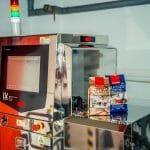Mitsubishi Electric sees time-sensitive networking as the future and is focusing its development activities on the new industrial communication network CC-Link IE TSN. Besides a fully compatible product portfolio, the automation specialist has announced development solutions for device makers.
Click here to watch this video on YouTube
YouTube share link: https://youtu.be/mGpAGqszX0Y
Founded in 1921 and with its headquarters in Tokyo, the Mitsubishi Electric Corporation is one of the leading international electronics and electrical equipment manufacturers and has sales offices all over the world. The Factory Automation Division offers a full portfolio of automation products including CNC control systems, laser and eroding machines, PLCs, frequency inverters and servos as well as industrial robots and software.
The open fieldbus network CC-Link was developed by the Mitsubishi Electric Corporation in 1997 and made an open technology in 2000 so that independent manufacturers could incorporate CC-Link compatibility into their products. Since then, the management and further development of the network technology have been taken care of by the CC-Link Partner Association (CLPA). According to Piotr Siwek, Team Leader Product Marketing Factory Automation EMEA at Mitsubishi Electric Europe, one of the major benefits of being a member of the CLPA itself is the contact with experts from other fields of automation such as sensor technology, for example, which has enabled the company to develop further partnerships for the purpose of developing joint customer and market solutions.
“CC-Link IE TSN is one of the most advanced communication networks for the industrial sector. Having such an efficient network is very important for us as a full service-provider as it enables all the different components to communicate with each other effectively and it also supports efficient edge computing”, says Siwek.
Mitsubishi Electric will help other CLPA partners to develop CC-Link IE TSN-compatible products. “Remote stations (slave functionality) are already supported – customers can select their development technology as both the ASIC development kit and protocol stack are already available. The latter reduces development effort to a minimum without compromising on functionality while the ASIC version enables the TSN technology to be used to its full potential”, says Siwek. He announces that by the start of 2020, development kits will be available for the master station too, again in the form of ASICs and a software stack.
The company already presented its own CC-Link IE TSN-compatible products, including PLCs, decentralised I/Os, operator terminals and frequency inverters, on the CLPA’s stand at SPS 2019.
It also has the new ground-breaking servo technology Melservo-J5 in the pipeline which was also demonstrated on the CLPA’s SPS stand. Siwek sees the main benefit of CC-Link IE TSN in this field of application as being the fact that servo drives can be directly controlled in the same network, along with the other automation components: “We can integrate motion controllers without compromising on performance and synchronise axes in real time. Automating a machine or production line enables the customer to use a single network to carry out a full range of tasks. That reduces costs and naturally also saves time.”
Siwek sees the versatile communication network having universal benefits: “Ultimately, everyone in the EMEA region will also benefit from the Ethernet-based simple cabling and low engineering costs – the automotive and consumables industry but also the food and beverage industry and the mechanical engineering sector as a whole, for example. Existing Ethernet-based networks can be integrated via TSN which protects investments made.” Mitsubishi Electric aims to add CC-Link IE TSN capabilities to its whole product portfolio, including all robot models, by the end of 2020.





